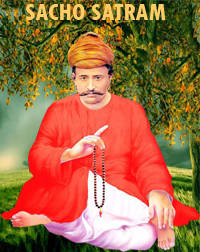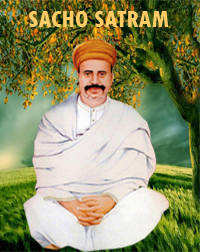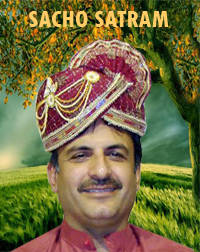During one of his soul-stirring Satsangs, Hazir Swaroop Sai Sadhram Saheb beautifully elucidated the true meaning and significance of Bhakti.
Bhakti is not tied to a person’s health, status, or circumstances. Even when people are unwell, living in poverty, or facing unfavourable situations, true Bhakts remain steadfast in their Bhakti. They are unaffected by their personal conditions and continue to engage in Bhakti with unwavering dedication.
Those deeply immersed in true Bhakti possess a unique and radiant aura. Their conversations, discussions, and messages hold profound value.
The wisdom conveyed by genuine devotees is rich and authentic, often exceeding the grasp of an ordinary individual.
Saijan narrated an example of two enlightened ascetics to convey a profound spiritual insight. He shared that one mystic told the other that when God grants him something, he feels grateful, and when God withholds, he practices patience. Hearing this, the second ascetic laughed and compared him to a dog, explaining that dogs behave the same way—they wag their tails in gratitude and lick the hands and feet of those who feed them. When dogs receive nothing, they simply lie down without making a fuss.
The second mystic then shared his own perspective, saying that his approach was quite different. He explained that when God provides him with something, he practices patience, as it reminds him to use the resources wisely, respectfully, and without waste. On the other hand, when God withholds, he feels grateful because it frees him from the responsibility and stress of managing what has been provided.
Saijan concluded by emphasising that the dialogue between the two mystics is deeply intricate and thought-provoking. Determining which perspective is right or wrong is nearly impossible, as both reflect unique and profound spiritual viewpoints.
Hazir Swaroop Sai Sadhram Saheb also emphasised that it is incorrect to think that God is biased toward the rich or the poor.
To illustrate this, Saijan shared another story about a king and his minister. He explained that one day, the king posed a challenge to his minister, asking him to interpret the meaning of the following phrases in a sensible and logical way:
1. Neither here nor there.
2. here but not there.
3. not here but there.
4. Both here and there as well.
The king demanded that the minister’s explanation must be thoughtful and meaningful.
The minister politely requested a few days to contemplate the phrases and assured the king that he would provide accurate explanations.
After a few days, the minister brought a man before the king and explained that this individual was a criminal who caused trouble for everyone around him. The minister further stated that when such a person dies, they receive no mercy from God. Thus, the man is neither good here on Earth nor good there before God, as he will face divine punishment.
The minister concluded that this example perfectly illustrated the meaning of the first phrase: **”Neither here nor there.”**
The next day, the minister presented a wealthy man before the king and explained that, while this man was enjoying all the comforts and luxuries of life, he was dishonest and deceitful. Although he appeared happy here, he would not experience the same in the hereafter, as God would hold him accountable for his actions on Earth.
The minister concluded that this example perfectly illustrated the second phrase: **”Here but not there.”**
The following day, the minister brought a humble, saintly man before the king and explained that this man lived a life of simplicity, free from worldly desires. He devoted most of his time to prayer and meditation, having little to no comforts in this world. However, when he departs for the hereafter, God will bless him with ultimate peace and contentment.
The minister then clarified that this saintly man perfectly exemplified the third phrase: **”Not here but there.”**
On the fourth day, the minister presented a wealthy man before the king and explained that this man was not only prosperous but also exceptionally honest and kind-hearted. He consistently helped others, lived a virtuous life, regularly engaged in prayer, and was deeply devoted to God. As a result, he enjoyed happiness and contentment in this world and would continue to experience the same in the hereafter, as God would bless him with true joy and peace.
The minister concluded that this man perfectly embodied the meaning of the final phrase: **”Both here and there as well.”**
Hazir Swaroop Sai Sadhram Saheb explained that the path to true understanding and spiritual growth depends on one’s approach to life’s circumstances. Ultimately, it is our inner devotion, patience, and reverence for God that guide us toward peace, both here and in the hereafter.



